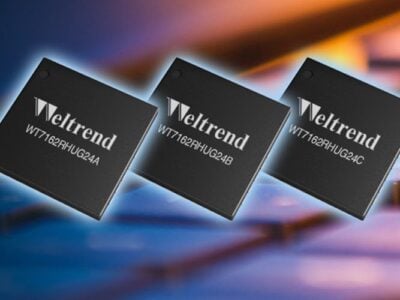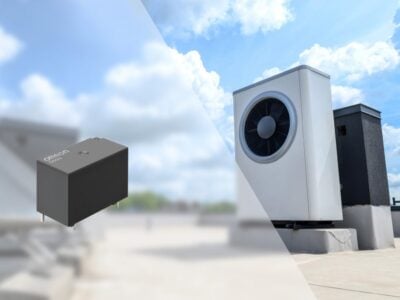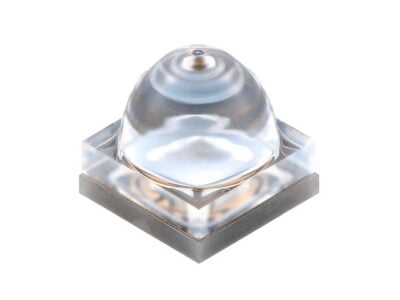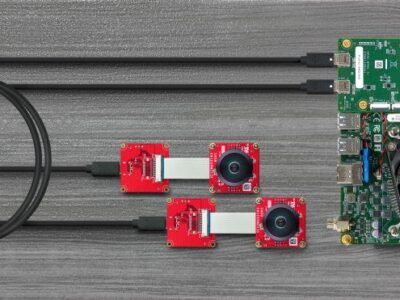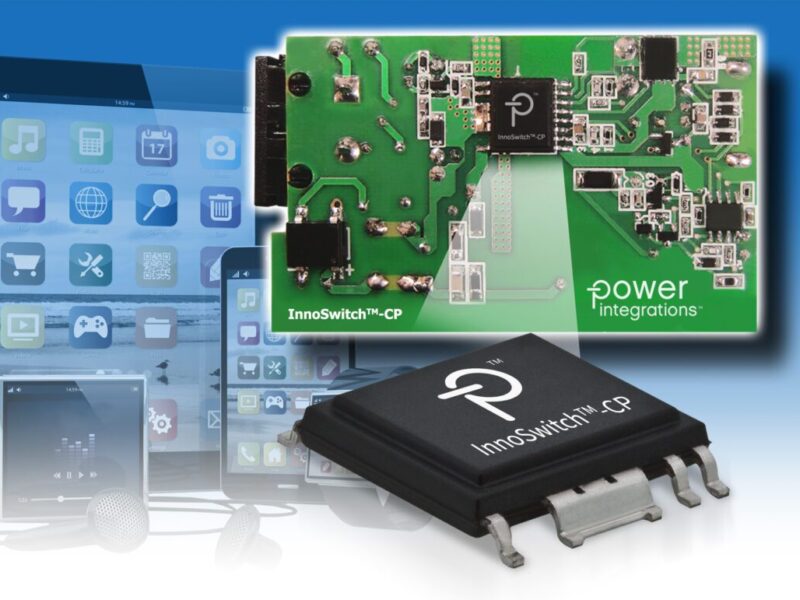
Power Integrations adds InnoSwitch device for optimised fast charging
InnoSwitch devices all use secondary-side regulation for accurate output control, but eliminate optocouplers or extra transformer windings to feed back output measurements across the isolation barrier in the converter. Instead they use PI’s FluxLink, essentially a single-turn transformer formed in the leadframe and other conductors within the device’s package. The package contains the controller IC, plus the 650-V offf-0line switching MOSFET.
The -CP family of off-line CV/CC flyback switching ICs incorporate a constant power output profile which, when paired with an adaptive-voltage protocol such as Qualcomm Quick Charge 3.0 or USB-PD, permits smart mobile device makers to optimise charging time across a range of products. A single charger design, equipped to negotiate with the device being charged, can serve many different products. Developers employing adaptive charging technology achieve faster charge times, improved charging efficiency and backward compatibility with the 5V USB BC 1.2 specification, all while minimising overall thermal management and battery charging system cost.
FluxLink technology permits the use output synchronous rectification (FET-as-diode), adding to efficiency across the full load range. For example, no-load consumption at 230 VAC is less than 10 mW, while full-load efficiency exceeds 90%. InnoSwitch-CP devices easily meet all global energy efficiency regulations, PI adds. Earlier charging protocols (e.g. version 2.0 of Qualcomm Quick Charge) commanded variable charge levels (to maximise energy transfer while limiting heat build-up) in a few relatively large voltage steps. Chargers built with the InnoSwitch-CP will permit 200mV increments of charging voltage. This permits the delivers power to more closely follow the charging profile demanded by the ‘client’ device and therefore to enable charging in less time.
Explains Shyam Dujari, director of product marketing at Power Integrations: “The cost of a charger is proportional to its power rating, but the voltage and current required for optimal fast charging of the battery is dependent on factors such as battery size, chemistry charge level and the thermal environment. By providing a constant power output, InnoSwitch-CP allows battery-operated devices to draw up to the maximum power of the charger at any selected output voltage, optimising charge time and cost. This allows OEMs to offer consumers shorter charge times and increased device availability, while simplifying the accessory supply chain.”
InnoSwitch-CP ICs incorporate a comprehensive suite of advanced protection features including: OVP; output OCP with 3V auto restart; hysteretic thermal shutdown and line input overvoltage protection with accurate brown-in/brown-out thresholds. Devices are fully compliant with safety and regulatory standards, including: 100% production HIPOT compliance testing equivalent to 6 kV DC/1 sec; reinforced insulation; and isolation voltage testing to above 3,500 VAC. They are UL1577 and TUV (EN60950) safety approved and EN61000-4-8 (100 A/m) and EN61000-4-9 (1000 A/m) compliant.
PI offers a reference design in which the part is paired with its CHY103 ‘ChiPhy’ interface IC that provides QC 3.0 and QC 2.0 interface. The CHY103 adjusts the feedback levels in the secondary side of the converter circuit so that the InnoSwitch is given the correct set-point output levels, to the 200-mV steps, as demanded by the charging protocol.
Two devices are available. The INN2214K IC delivers 15W output power for universal voltage chargers and adapters, while the larger INN2215K part delivers up to 22W for similar applications. InnoSwitch-CP samples are available now, priced at $0.90 (10,000).
Power Integrations; www.power.com/innoswitch-cp/
 If you enjoyed this article, you will like the following ones: don't miss them by subscribing to :
eeNews on Google News
If you enjoyed this article, you will like the following ones: don't miss them by subscribing to :
eeNews on Google News

